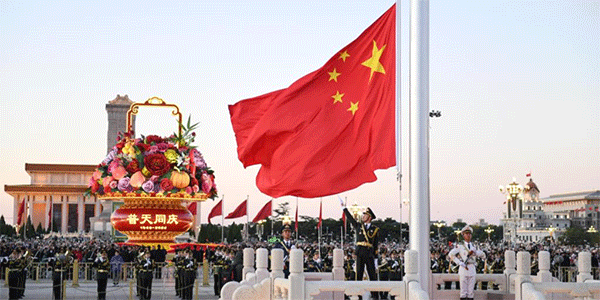Chinese celebrate 75th birthday of people’s republic with pride, hope
BEIJING (CHINA DAILY) -- Ready to welcome myriad domestic and foreign tourists over the coming days, Tian’anmen Square, the political heart of China and no stranger to pomp and ceremony, has been given a festive makeover featuring an 18-meter-high flower basket centerpiece.
 |
| A flag-raising ceremony marking the 75th anniversary of the founding of the People’s Republic of China is held at the Tian’anmen Square in Beijing, capital of China, Oct 1, 2024. --Photo Xinhua |
The square is pulsating with vitality as children frolic around waving national flags, youngsters proudly display the national flag stickers on their cheeks, and the elderly hum along to the patriotic melody of “Ode to My Homeland.”
The People’s Republic of China (PRC) on Tuesday marked its 75th founding anniversary. From bustling cities like Beijing, where the streets are lined with fluttering national flags and floral displays, to the doorways of communities and neighborhoods adorned with lanterns and Chinese knots, similar scenes were seen across the country.
READ MORE: Xi to pay tribute to fallen heroes ahead of 75th anniversary of PRC
On the morning of the National Day, Tian’anmen Square was full of people gathered to witness the national flag-raising ceremony, one of the most symbolic events to celebrate the birthday of the PRC.
At 6:11 am, as the flag was raised, over 120,000 spectators in the square sang the national anthem. Doves and balloons were released, and tears glistened in many eyes. Many others, unable to attend in person, tuned in to the live broadcast on state media.
Zhang Yan was dwarfed in stature but not in style. Wearing an ornate silver headpiece and crescent-shaped necklace, the traditional attire of Miao, one of the 56 ethnic groups of the Chinese nation, she sang a song familiar to most Chinese, “Today is Your Birthday, My Motherland.”
“As our homeland flourishes, so do we,” said the 37-year-old woman. “Everyone, regardless of ethnicity, could play a part in the country’s progress.”
On the eve of the National Day, Chinese President Xi Jinping and other senior leaders paid their respects to fallen heroes by laying flower baskets at the Monument to the People’s Heroes.
A day before that, Xi, also general secretary of the Communist Party of China (CPC) Central Committee and chairman of the Central Military Commission, conferred national medals and national honorary titles on recipients of the highest state honors at the Great Hall of the People.
A total of 15 people, including scientists, teachers, medics, a veteran war hero, a border patrolman, a legendary ping-pong coach and an acclaimed actress, were awarded.
Honoring these role models, Xi made a rallying call to make China stronger.
“All Party members and people of all ethnic groups should take heroes and role models as examples, unite and strive forward to form a mighty force to build a strong China,” Xi said.
Great changes
On this very day 75 years ago, the late Chinese leader Mao Zedong stood on Tian’anmen Rostrum and declared the birth of the people’s republic, marking a watershed moment in the 5,000-year history of Chinese civilization.
The past seven decades saw China rise from a poor country to the world’s second-largest economy and a major country moving ever closer to the center stage of the globe.
Just days before the National Day, Xi said China, under the CPC’s leadership, has achieved the twin miracles of rapid economic growth and long-term social stability over the past 75 years.
China’s average annual GDP growth rate since it began reform and opening up in 1978 has stood at about 9 percent. The country has firmly become a global manufacturing powerhouse. The list of Made-in-China products continues to grow, now including large passenger aircraft and electric vehicles among the latest additions.
The average Chinese have become richer, with per capita disposable income rising 76-fold in real terms. The average life expectancy of Chinese has more than doubled from 35 to 78.
“The earthshaking changes have taken place in China,” Xi said, reasserting that national rejuvenation is on an irreversible historical course.
Notably, the country has eliminated absolute poverty and built the world’s largest systems in social security, education, and healthcare.
Over the past 75 years, China has undergone the largest and fastest urbanization process in world history. Historically an agrarian country, China now has urban residents outnumbering those in rural areas by a considerable margin. “China’s development has shattered what once seemed like a fate destined for generations,” said Qin Chuan, playwright of the acclaimed musical Dongguan East, which tells the story of millions of rural youth migrating to factory towns like Dongguan in search of work, eventually settling down as new urbanites.
From a nation with limited paved roads and half of its 21,800-kilometer railways paralyzed, China has grown into an infrastructure giant. It now boasts the world’s largest high-speed railway network and expressway network.
With an endeavor to promote high-end, intelligent and high-quality development, China saw an upward trajectory in its science and technology development.
(Latest Update October 3, 2024)
|